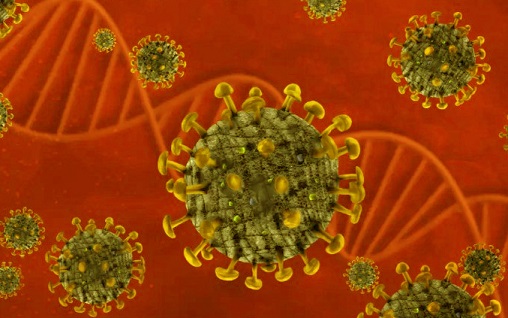S1 Subunit of the SARS-CoV-2 Spike Protein Can Impact Over 60,000 Human Proteins and 2,500 Biological Processes!
Nikhil Prasad Fact checked by:Thailand Medical News Team Dec 04, 2024 4 months, 1 week, 1 day, 23 hours, 8 minutes ago
Medical News: A revolutionary study led by Giovanni Colonna from the Unit of Medical Informatics at the University of Campania, Italy, has unveiled the astonishing impact of the S1 subunit of the SARS-CoV-2 spike protein on human biology. This research sheds light on how a single viral protein engages with over 60,000 human proteins and influences more than 2,500 biological processes, offering new perspectives on the virus's effects on the human body, particularly in COVID-19 and "long COVID."
 S1 Subunit of the SARS-CoV-2 Spike Protein Can Impact Over 60,000 Human Proteins and 2,500 Biological Processes
S1 Subunit of the SARS-CoV-2 Spike Protein Can Impact Over 60,000 Human Proteins and 2,500 Biological Processes
Using cutting-edge interactomic analyses and reverse engineering techniques, this study explores how the S1 subunit - a critical component for the virus's entry into human cells - goes beyond facilitating infection to exert far-reaching effects on various cellular systems.
S1 Subunit: Beyond ACE2 Binding
The S1 subunit is a fragment of the SARS-CoV-2 spike protein responsible for recognizing and binding to the ACE2 receptor on human cells. This binding facilitates the virus's entry into cells, initiating infection. However, the S1 subunit also circulates freely in the bloodstream of infected individuals and those vaccinated against COVID-19, raising questions about its broader biological impact. This
Medical News report delves into how this protein interacts with human systems beyond its primary role.
Using databases like BioGRID and STRING, the researchers uncovered a massive network of 60,000 proteins interacting with S1. This network spans diverse biological processes, with the protein influencing cellular pathways such as immune response, protein synthesis, and even mechanisms linked to cancer development.
Reverse Engineering the S1 Subunit's Impact
By applying a reverse engineering approach, the study identified 27 specific one-to-one interactions between the S1 subunit and human proteins. Unlike the collective action of multiple viral proteins during an active infection, these one-to-one interactions show S1's standalone potential to disrupt biological functions. Notably, proteins in the nervous system, liver, blood, and lungs appeared particularly susceptible to S1's influence, correlating with the organ systems often affected in COVID-19.
A significant finding was S1's ability to alter the ubiquitin system, a key regulator of protein degradation. This mechanism disrupts tumor suppressor functions and cellular stress responses, indicating a potential role in cancer-related pathways. One striking interaction involves TP53, a well-known tumor suppressor protein, highlighting S1's ability to exploit vulnerabilities in human cells.
A Complex Metabolic Landscape
The study revealed that S1 operates in a vastly interconnected metabolic network. While it engages with approximately 1,430 biological processes when interacting with other viral proteins, it influ
ences 2,557 processes when acting alone. This dramatic increase underscores S1's standalone potency in altering cellular functions. The protein's broad impact is partly attributed to its intrinsic properties, including its structural flexibility and numerous post-translational modification sites.
These findings demonstrate how S1's chemical and physical characteristics enable it to bind with diverse human proteins. The protein’s flexibility enhances its ability to interact with negatively charged proteins, while its solubility supports prolonged activity in various cellular environments.
Implications for Long COVID and Vaccine Safety
The discovery that S1 persists in the blood after infection and vaccination raises concerns about its role in "long COVID" and vaccine side effects. Long COVID, characterized by symptoms like brain fog, fatigue, and immune dysregulation, may partly stem from S1's ongoing interactions with human proteins. This research also emphasizes the need for further investigation into the balance between vaccine efficacy and potential adverse effects linked to S1.
The study’s insights provide a basis for developing targeted therapies to mitigate S1's harmful effects while preserving its role in vaccination strategies. By focusing on the specific proteins and pathways disrupted by S1, future treatments may offer relief to long COVID sufferers.
Conclusions and Future Directions
This groundbreaking research reveals the extraordinary ability of the S1 subunit to influence human biology on a massive scale. Its interactions with over 60,000 proteins and control over more than 2,500 biological processes highlight its complexity and potential for both harm and scientific discovery. These findings urge the medical community to reconsider how we approach COVID-19 treatment and vaccine design.
The study underscores the importance of understanding viral protein interactions to combat not only COVID-19 but also broader health challenges posed by viral infections. As researchers explore these interactions further, they pave the way for innovations in therapeutic and preventive strategies.
The study findings were published in the peer-reviewed journal: Biomolecules
https://www.mdpi.com/2218-273X/14/12/1549
For the latest
COVID-19 News, keep on logging to Thailand
Medical News.
Read Also:
https://www.thailandmedical.news/news/breaking-brazilian-proteomic-study-finds-that-1652-human-proteins-involved-in-key-cellular-pathways-are-dysregulated-by-sars-cov-2
https://www.thailandmedical.news/news/breaking-medical-news-discovery-of-hidden-viral-proteins-in-ssrna-viruses-opens-a-new-dimension-in-virology-and-is-relevant-for-sars-cov-2
https://www.thailandmedical.news/news/breaking-covid-19-news-australian-scientists-discover-a-microrna-called-cov2-mir-o8-that-is-encoded-by-sars-cov-2-and-is-possibly-pathogenetic
https://www.thailandmedical.news/news/breaking-hypothesis-that-majority-exposed-to-sars-cov-2-will-have-shortened-lifespans-validated-by-study-showing-nsp2-impairs-human-4ehp-gigyf2-comple
